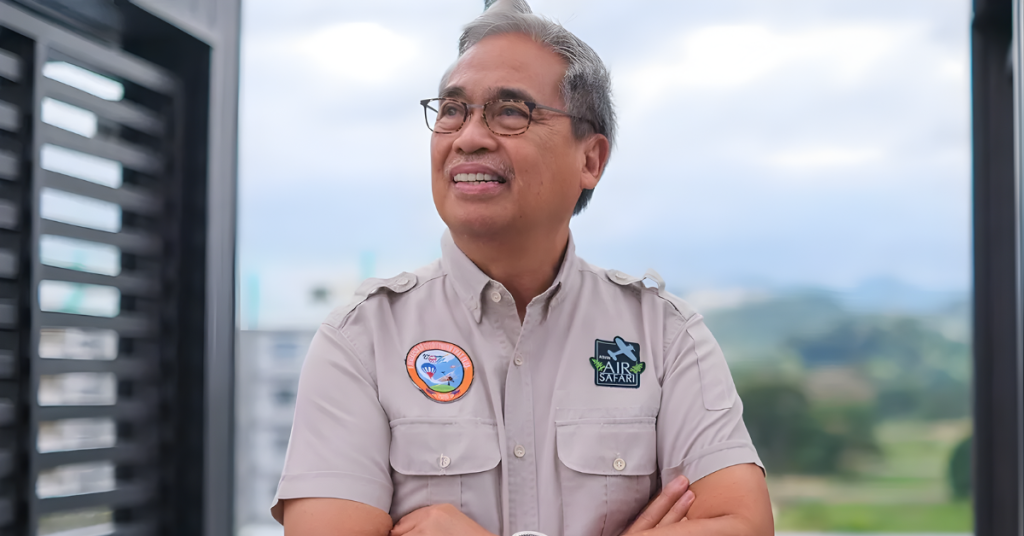Great entrepreneurs often discover their biggest ideas not in boardrooms, but in unexpected places. For Captain Joy Roa, that moment came during a walk on a beach in Florida, after a frustrating encounter at a university left him doubting his next steps.
“I was in Florida and wanted to take up masters in aviation management,” Roa recalled in an interview with Financial Adviser PH. “The person interviewing me in Embry Riddle University asked me if my intention in studying was because I wanted to live in the States. I was not happy with her questioning and the interview. Feeling frustrated and upset I decided to walk in the beach at Daytona.”
As he reflected, an airplane passed overhead towing an advertising banner across the sky. It was a simple moment, but one that shifted the trajectory of his career. “I saw an airplane towing an advertising banner. I said to myself that I will introduce banner towing at home instead of going back to school.”
Introducing a New Kind of Advertising
When he returned to the Philippines, Roa brought the idea with him. At the time, banner-towing was unheard of locally, and he saw an opportunity to pioneer a new medium. “It was a challenge to sell advertising but the concept was new and I was successful in marketing a new medium of advertising,” he said.
Like many first-to-market ideas, the concept attracted curiosity but also encountered headwinds. The 1980s in the Philippines were marked by political unrest and economic turbulence. Currency exchange rates swung wildly, businesses struggled to prioritize expenses, and advertising budgets shrank.
“However, this was the time that our country was having issues with the dollar exchange rate and companies would rather invest in raw materials or inventory of goods instead of advertising,” Roa explained. “This was also the time when people were clamoring for change in government and advertising was last on the list of many. No one wanted to advertise and I had no choice except to sell my airplane.”
Turning Setbacks Into New Directions
Selling the plane could have been the end of the venture. Instead, Roa treated it as a stepping stone. In fact, he sold it for more than he had invested. “I was able to sell my plane for a profit after using and earning from it. I made my profit because of the dollar exchange rate. It was the same value in dollars but double in pesos.”
At that point, he could have simply walked away with a healthy return. But once again, restlessness and vision steered him forward. “Instead of walking away with the profit, I decided to invest the money in airplanes,” he said. “I was able to buy two and money to spare to refurbish and make them look good and sellable to overseas aviation enthusiast.”
The refurbishing opened new doors. While sourcing parts for restoration, Roa built relationships with international suppliers. Soon, friends and colleagues in the Philippines began asking if he could help them acquire the parts they needed. “When refurbishing these planes, I was able to meet suppliers of parts and when my local friends needed parts, they would always ask me where to buy. I said I can have it sent to Manila and this is how the parts business started.”
Building Toward Charter Aviation
But the story didn’t end there. The refurbished planes, polished and ready, didn’t sell as quickly as expected. Once again, Roa turned a challenge into an opportunity. “When I completed the airplanes and no one was buying them, I rented them out to cover for their insurance expenses and this started my charter business,” he said.
From a frustrating interview in Florida to banner ads in the Philippine skies, from refurbishing planes to establishing charter flights, each step in Roa’s career reveals the same mindset: challenges are not dead-ends, but springboards.
Lessons in Adaptability
For entrepreneurs, Roa’s journey is a masterclass in adaptability. Each pivot was born not from perfect planning, but from his ability to reframe setbacks as opportunities. He didn’t get the academic degree he originally sought, but instead built an aviation business with multiple revenue streams—from advertising and parts supply to restoration and charter services.
In industries as volatile as aviation, that ability to adjust quickly can mean the difference between survival and collapse.
Roa himself puts it simply: frustrations, whether with people or circumstances, should never be final. On the contrary, they can be the very moments when opportunity appears. “I saw an airplane towing an advertising banner,” he remembered. “I said to myself that I will introduce banner towing at home instead of going back to school.”
What began as an idea on a beach walk became the seed for a lifetime in aviation.
![]()



